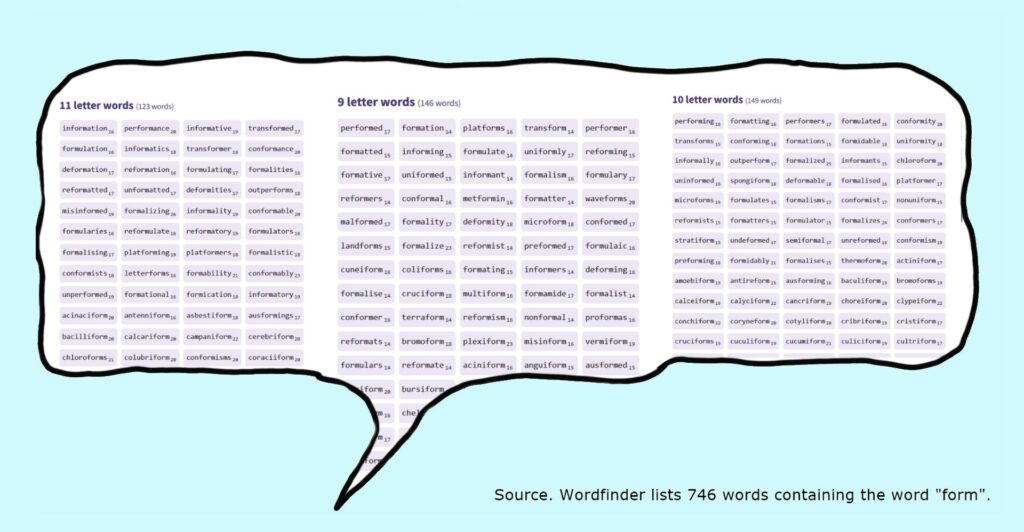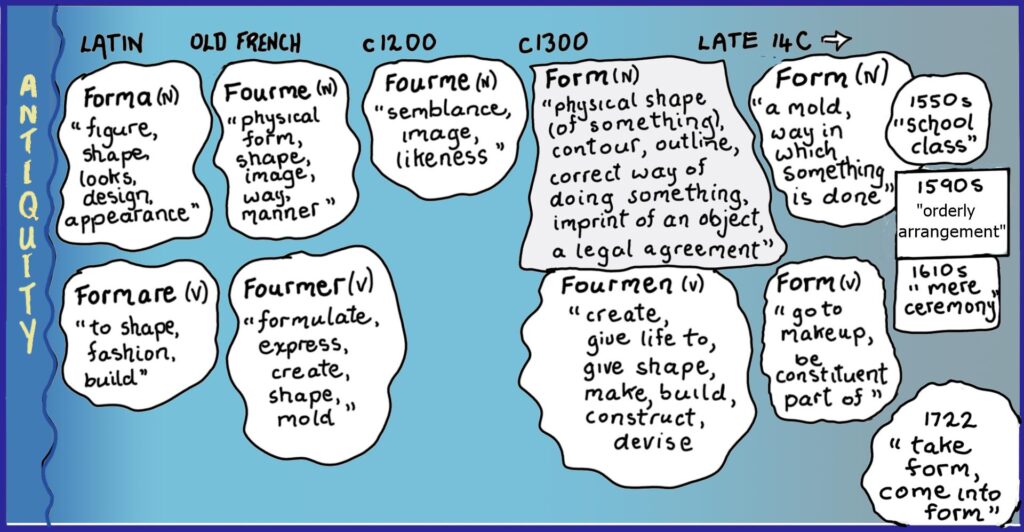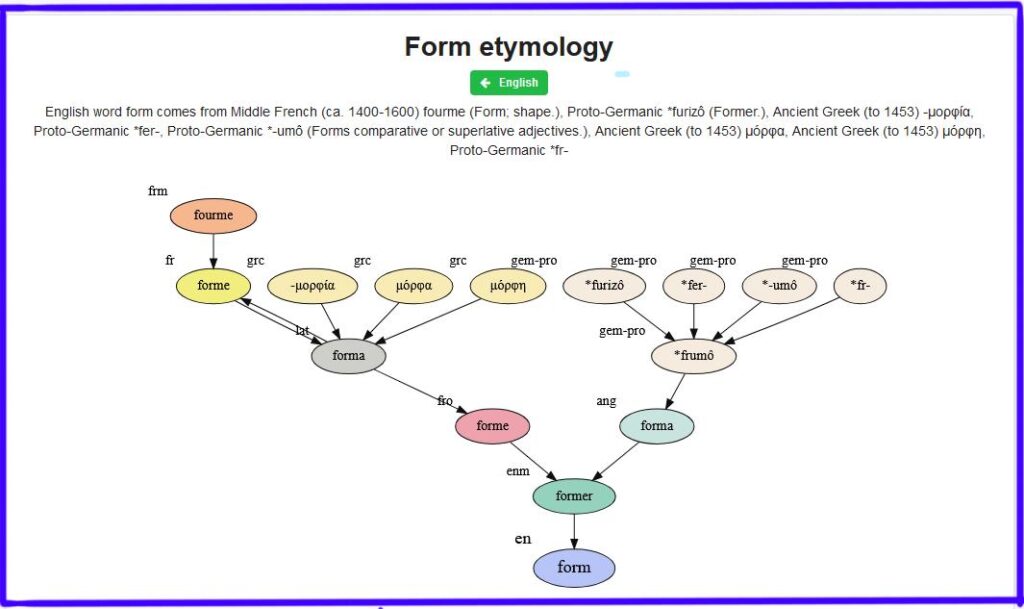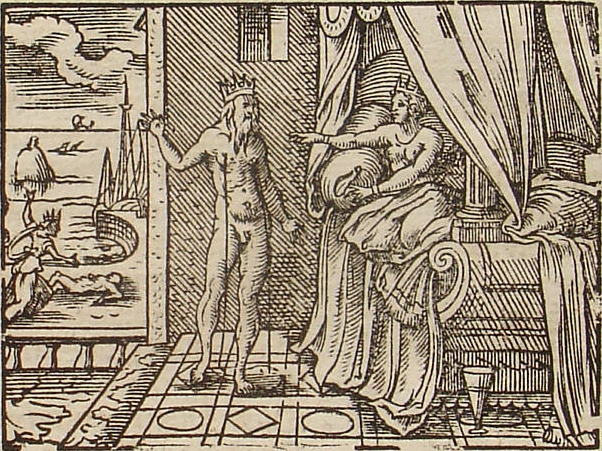The Legend of “Form”
(The fantastic story of the word “form”)
We are told we live in “The Information Age”. Experts even argue whether it forms the Third or the Fourth Industrial Revolution. We feel so sure we know what “Information Technology” is that we call it “IT”, which spells “it”
But who actually knows the meaning of the word “information”? Perhaps, like the word “energy”, its meaning is profound beyond words – we are all vitally sentient of it yet no one can truly know what it is.
The fundamental meaning of “information” resides in the word “form” – an amazing word that speaks volumes of our human condition and our personal relationships with the universal reality, which constantly varies whether we are awake or asleep. This page is written a little like a diary to illustrate the process by which we can discover and conserve the most transcendent meanings of a word.

The fundamental meaning of “information” resides in the word “form”. Two of the above 746 words provided by wordfinder.com will prove vital to our search for the most transcendent meaning of the word “form”: the verb “inform” (to form, shape) and the noun “formation” (fashioning, creation, a forming, shaping,”)
Minding my Tongue
(Exemplar of how to search for a word’s meaning)
“Form”?! Maybe you, like me, have never reflected on our use of the word “form”? It seems such small, plain, simple word that can be easily defined in a short paragraph.This journey exploring its historic meaning reveals it may well be one of our most profound, potent words, unimaginably rich in meaning.
My search for the meaning of words typically involves traveling with a word to antiquity and seeing how its meaning changes with societal behaviour over millennia. My constant companions and guides are the Online Etymology Dictionary and the Conservation of Energy Principle. The former provides known meanings of a word in any period while the latter provides a universal benchmark to evaluate the sustainability of a society and its language.

Both noun and verb forms of the word “form” emerge out of the mists of time about 1200 AD with relatively inclusive and transcendent meanings in that they are associated with in a general way with formations or shapes and the act of creating them. Since 1200 the meaning has become progressively more restricted and exclusive e.g. “form” is associated with a document, a nest, a classroom, a level of performance etc.
What historic events coincide with this loss of inclusive meaning since 1200AD ?
Notably this began a period when churches and monasteries flourished and the Norman kings instituted large “Royal Forests”, displacing many people.
From about 1250 climate change occurred in the form of The Little Ice Age in Europe reducing crop yields, as did the Black Death plague. The latter disproportionately decimated the Latin-French speaking ruling class and English rapidly began to replace Norman French as the dominant language.
Then from about 1650 Cartesian dualism with its psychotic belief that philosophy is just a deductive way thinking rather than the holistic living and loving of wisdom took hold. This delusion soon infused our Crown dialect of English giving rise to the English Combustion Revolution (aka English Industrial Revolution) in the 1700s, facilitating a radical change of culture that has generated an Anthropocene this past three centuries.
The legend of the word “form” is obscure prior to the 13th century:
..a word of unknown origin. One theory holds that it is from or cognate with Greek morphe “form, beauty, outward appearance” (see Morpheus) via Etruscan [Klein].
https://www.etymonline.com/word/-form
However, as the screenshot of the cooljugator.com diagram below shows, the word “form” clearly had a life prior to 1200 but what did it mean at any time in that period ?

Credit: https://cooljugator.com/etymology/en/form
This lineage of “form” prior to 1200 is supportive of the hypothesis that the humble word “form” plays a much more profound role in our lives than we know. However it does not provides any information of the meaning given the word by different cultures.
An alternative approach is to ask how many words contain the word “Form” compared to other prime words?
Wordfinder discovers 746 words containing the word “form”.
By comparison it only discovers 93 words containing the word POWER, 123 words containing the word GOD and 51 words containing the word SHAPE.
Most interesting, it discovers 1680 words containing the word ACT and 212 words containing the word ACTION.
This is interesting, even enlightening because “action” is the essence, the core story of the Conservation of Energy Principle. Energy is “action”. All the universal potential is “active”.
Also “act” and “action” are both transcendent words – each of them being both a noun and a verb.
This indicates “form” has the power to enable us to transcend paradox and our human condition if used wisely. Antiquity may have much to teach us.
Note: such word-finder lists are only a rough guide and come with major caveats. For instance, very short words like “act” are far more likely to be included in words than those containing five or more letters in general. This said, the prevalence of transcendent words like “form” and “act” indicates they both convey immense meaning, perhaps as vast as involving the essential meaning of existence and the nature of energy.
Perhaps the reference to Morpheus (morphe) can be helpful in our search for meaning.
A Millennia Long Leap to Profound Meaning
Morpheus
https://www.etymonline.com/search?q=morpheus
late 14c., name for the god of dreams in Ovid, son of Sleep, literally “the maker of shapes,” from Greek morphē “form, shape, figure,” …. a word of uncertain etymology.
Many of us are familiar with the word “metamorphosis” ( Greek meaning “a transforming, a transformation”) from poems, paintings, books, films, doctors. our biology teachers and other media. And the verb “morph” has become increasingly commonplace since the 1960s.
Both “morphe” and “form” are words of uncertain etymology though there is a theory “form” is from or cognate with Greek morphe – “form, beauty, outward appearance”
However we can track the meanings given to “shape” back to its PIE root *(s)kep – forming words meaning “to cut, scrape, hack”, which give rise to German schaffen “shape, create, produce”.
Morphe, form and shape share significant common meaning, much of it expressing active involvement creation.
SIDE NOTE. A very significant discovery is that the word “meta” traditionally meant “in common with” and arose from the ancient PIE word *me- “in the middle“.
Contrast this to the use of “meta” by the “Information Technology“oligarch Mark Zuckerberg. He uses the word “meta” to mean “higher, beyond”. This exclusive definition* of “meta“destroys the compassionate (inclusive) meaning of “metamorphosis” (transformation) and bespeaks a dangerous psychopathy that imperils Mankind – especially if his use of “AI” is like that of ChatGPT, which is in profound denial of the principles of physics.
* To quote EtymOnline re the word “meta”:
“The third, modern, sense, “higher than, transcending, overarching, dealing with the most fundamental matters of,” is due to misinterpretation of metaphysics (q.v.) as “science of that which transcends the physical.” This has led to a prodigious erroneous extension in modern usage…” END SIDE NOTE
The reference to Morpheus proves to be promising, if not invaluable and fantastic. An Internet search with the word “Morpheus” discovers the great, vivid legends of the interactions of the Greek-Roman pantheon of gods with us mortal men, especially the legends portrayed by the Roman poet Ovid in his most famous narrative poem about 8 CE: “Metamorphoses”.
Our deepest experiences are played out in the legendary poem. Divinity. Grief. Deceit. Sleep. Death. Night. Dreams. Reality.
All three words “form”, “morph” and “shape” are paradoxically both nouns and verbs reminding us thought and deed are one.
They are transcendent words enabling us to live the paradox of information:
To inform is to be informed.
To create is to be created.
Such holistic language typically reflects a sustainable culture i.e one that is in relative accord with the principles of physics.
Britannica.com says this of Morpheus, “in Greco-Roman mythology, one of the sons of Hypnos (Somnus), the god of sleep. Morpheus sends human shapes (Greek morphai) of all kinds to the dreamer, while his brothers Phobetor (or Icelus) and Phantasus send the forms of animals and inanimate things, respectively.”
Hypnos was the son of Nyx (Night) and the twin brother of Thanatos (Death). Some say Hypnos had thousands of sons.

Engraving by Virgil Solis for Ovid’s Metamorphoses Book XI, 650–749.
Public Domain
The Metamorphoses (Latin: Metamorphōsēs, from Ancient Greek: μεταμορφώσεις: “Transformations”) is a Latin narrative poem from 8 CE by the Roman poet Ovid.
Ovid’s telling of the legend of Morpheus visiting Alcyone in the form of her dead husband can be read in English at the Theoi Project.
There is also a character in the movie The Matrix called Morpheus and a synopsis of script suggest its legend is a variation on the ancient Greco-Roman legends, playing on our contemporary struggles to divine delusion from reality, delusional hope from true hope of physics.
These ancient Greco-Roman legends evoke in us the principles of physics, the ways of the universe.
They also express in a relatively compassionate way the tragicomedy of our human condition:
– the limitations of our thought process and the trace role of our self-awareness in our psyche;
– our fundamental state of uncertainty and our ingenious capacity for self-deceit and delusional hope;
– the constant fluctuation in the dynamic balances of the exclusive forces (the ego) and the inclusive forces (compassion) in our psyche;
– the vital. healing role of sleep, it being a time of our life in which our experiences of the day are collated, divined (learned from) and processed in fantastic, incomprehensible ways;
– and our continuous attempts and frequent failure to enjoy harmony with the continuous universal transformation.
Takeaway re the Word “Form”
Various formations of the word has been omnipresent during my decades endeavouring to find ways to transcend paradox and develop a science in our language of “energy”. |
As with energy, we are intimately sentient of the continuous universal transformation~~transaction yet no man (human being) can ever truly know what form is for we are but forms of energy.
The meanings of “energy” and “information” are inextricably intertwined to the deepest level.
We cannot talk about one without talking about the other.
Energy (the universal potential, all of which is active) is information continuously informing, transforming the countless, myriad possible forms of energy and, being forms of energy, we are informed even as we inform all.
Energy and information are paradoxically of each other.
“Form” is a fantastic word to be treasured and we are wise to conserve and employ its most transcendent meanings. Our compassionate use of formations of the word “form” can enable us to enjoy the most sustaining, wonderful manifestations of the universal potential.
And as with the word “energy”, we abuse and misuse the word “form” at our grave peril. All forms are of energy and no form is energy.
Second draft 9 April
See footnote 1 for a reflection on the legend of the word “fantastic”
See footnote 2 for a personal reflection re The Rivers of Sleep, Forgetfulness and Death in Greek legend
| Definition of Formation | Transcending Paradox | The Universal Transformation |
Footnote 1:
Reflection – (F)act is Fantasy.
‘Clearly “form” is a fantastic word.’ This was the first sentence I initially wrote when starting this story. Its beyond me why I jotted it down. Indeed it soon became obvious to me that this statement is not clear at all. So I decided it wise to remove the sentence until I knew the story of the word “fantastic”. Only now is it apparent to me that this seeming diversionary story is actually a vital tributary to the river of meaning, which is the “form”.

The above story informs us that the word’s origins reside in the Greek word phantastikos “able to imagine,” from phantazein “make visible” (middle voice phantazesthai “picture to oneself”), which in turn arose from the stem of phainein “to bring to light, make appear; come to light, be seen, appear; explain, expound, inform against; appear to be so”, which in turn arose from” from PIE root bha- (1) “to shine”, which is also the PIE root of many of our words associated with “to speak, tell, say.“
This story is fascinating because “bha” was once such a transcendent word, giving rise to a dizzying array of words associated with seeing and speaking. This array is dizzying because these words describe so many of our interactions during our life-long search to discover a greater reality, to manifest the universal potential in sustaining ways.
The question arises: why did “fantastic” lose so much of this ancient transcendent meaning through the Middle Ages and become associated with insanity, delusions and acting ridiculously? Was it because of climate change and associated war, famine and pandemic? Was it because of the arrogant use of new technology?
And now it is mainly used in a dismissive or derisory way as well.
Listen to our opinion makers – especially our most influential merchants, politicians and corporate media people. They commonly condemn ideas and proposals they do not like by saying these are “unreal” “not believable” and “the stuff of fantasy”.
Similarly they now associate the wonderful, life-celebrating word “conspire” with malignancy and use it to condemn personally inconvenient ideas as “conspiracies”. They even speak of “Cults, Conspiracies, and Fantasies of Knowledge” in the same breath. See exemplar at this Cambridge abstract
This psychopathic use of the Crown dialect of English language is characteristic of the ego, indicating a lack of compassion. Without compassion, the ego can easily have us become alienated from reality, arrogant, self-hating and ultimately self-destructive as individuals, institutions and societies. As we have seen, our ancestors used language in more compassionate ways with, for instance, PIE root bha meaning both “to shine” and “to speak, tell, say.” All existence involves paradox and this use of “bha” transcends the paradox of information: all things exist amidst the universal transformation, simultaneously informing all and being informed by all.
So it is important to note that the word “fantastic” has been associated since 1938 with creations and feelings “wonderful, marvelous”. Some English dictionaries describe this as a “trivial” use of the word. However it could actually be very profound, reflecting a healthy balance of compassion existing in parts of our English culture still.
Takeaway re “Fantastic”
Our lives are more fulfilling when we care to conserve the most transcendent meaning of words. We are more able to enjoy greater true hope of physics because the universal potential can be manifest in more marvelous and wonderful ways.
Observe how the word “marvelous” arises from the Latin words mirus “wonderful” and mirari “to wonder”. These arise from the PIE root *smei- “to laugh, smile” – as does the word “miracle”.
Old English noun “wundor”meant a “marvelous thing, miracle, object of astonishment,” while its verb “wundrian” meant to “be astonished,” also “admire; make wonderful, magnify,”
We experience this state when we enjoy compassion with its connective qualities of inclusiveness, sharing, generosity and humility. We human formations are opened in greater way to the universal transformation and are able to call forth and see the life force in forms around us even as these forms shine at us. We see reality more truthfully and are sustained more fully.
Footnote 2
Personal reflections on The Rivers of Sleep, Forgetfulness and Death in Greek legend
These ancient legends are so evocative of the truths of physics, the ways of the universe. My childhood was a blessed one of countless, timeless hours playing in “The creek” – the Waiorongomai River near our home. I often played in it all day, experimenting with its balances and flows. I went to sleep at night with its continuous chuckling, chattering, murmuring and occasional roar in flood informing and infusing my dreams.
In retrospect, the river was my greatest teacher, its sensations informing and grounding me in the truths of physics and imbuing me in the courage to question the ego-driven nonsense of our self-styled “physicists” and “science teachers”. The river is me. It is alive in my breath, my blood, my dreams, my being and it sustains my compassion, my connection with all.
Seven decades on my being is a river alive with childhood memories intertwined with dreams in which the stones, trees, oceans, stars and even my language all form rivers in and of each other. The Greco-Roman stories of the rivers of sleep, forgetfulness (oblivion), memory, death, fire, hatred and continuous transformation resonate in me.
Every river is a paradoxical story flowing with meaning and these ancient legends speak of societies living in relative harmony with the ways of universe compared to our Anglosphere culture.
The psychopathy of our modern Anglo corporate culture means many of us now demean sleep and live sleep-deprived existences. This dystopian culture deems “Time is money!” rather than time being a way of synchronizing our body’s rhythms with those of the stars. For instance, sleep is deemed “downtime” (inactive) while waking is deemed “uptime” (active). Perversely, even the word “woke” is now a term of abuse.
Ancient cultures and many contemporary indigenous cultures put high value on “dreamtime” and thus enjoy a more holistic experience of existence. Both “holy” and “health” arise from the PIE word *kailo- “whole, uninjured, of good omen” and sleep was a sacred time for healing.
Many of us have forgotten and forsaken this precious state of being even though our modern technology -computers, body scanners and other monitoring devices – provide powerful reminders that our experience of sleep and nightly dreams, far from being a time of inactivity as many of us have been taught to believe, is a time of our greatest activity.
In other words, sleep is a time of our life in which our experiences of the day are collated, divined (learned from) and processed in fantastic, incomprehensible ways. This profound process involves employing the ancient wisdom of our cells that has enabled them to sustain life for over 3 billion years through aeonic transformations of Earth so we and future generations can be sustained.
It is such a fantastic process that only in certain phases of sleep do our brains open to the rivers of sustaining information.
Deprived of those phases, we soon poison ourselves with accumulated neural waste and perish amidst delusions. We lose touch, lose sight, lose connection with the ways of the universe and our stories, lacking compassion, become ego-derived, deceptive and ultimately self-destructive.
